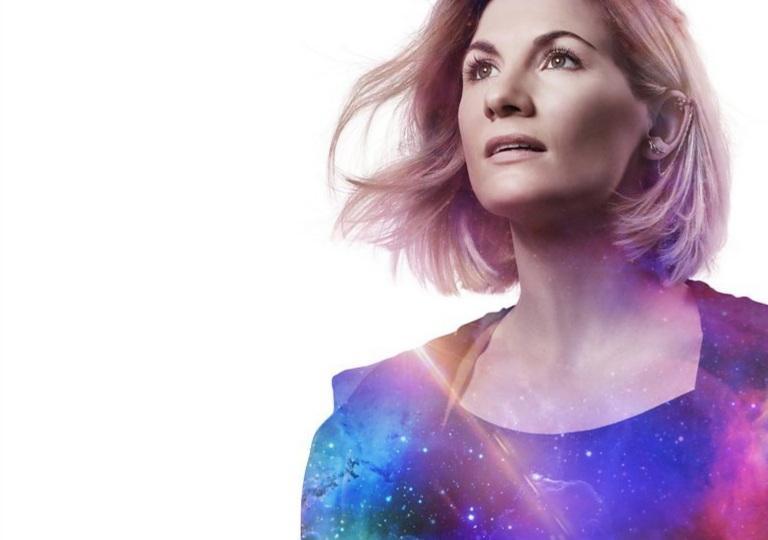
You should always trust your doctor, right? My favorite doctor — and after my late husband’s 20-year battle with chronic illness, we knew lots of doctors — is Doctor Who.
Yes, I’m a Whovian. And I do blame the dead husband for that. He knew more about the original series than I did, but we shared a deep love of the Doctor’s newest incarnations, from Christopher Eccleston’s Ninth Doctor through Peter Capaldi’s Twelfth Doctor. In the months leading up to my husband’s death in December 2016, we didn’t watch much Doctor Who, if any. His battle with lung disease culminated with excessive carbon dioxide robbing him of clear vision, among other things. With his passing on Christmas Eve Day, I didn’t even think about watching the Christmas special. I didn’t even remember that there was one.
Three years later, I found myself in a new house with our two (tween) children, who also enjoy the Doctor. BBC America was promoting the heck out of Jodie Whittaker’s Thirteenth Doctor and new season, which kicked off with a New Year’s Day special, rather than the Christmas specials of years past. The Thirteenth Doctor, portrayed for the first time by a woman, is someone my late husband never got to see. I really enjoy Thirteen, and I find her as Doctor-like as a Whovian could hope for. He would have loved her.
December is always especially hard for me and my grief, so when I saw there was a Christmas-through-New Years marathon of Doctor Who on cable, I plopped down on the sofa and began to reacquaint myself with the Doctor. I binge watched as often as I could. I became obsessed with finding episodes my husband and I had enjoyed together. But as I watched, I noticed themes and motifs in nearly every episode that my pre-loss mind had probably ignored.
Grief touches almost every episode of Doctor Who.
If you’re not a Whovian, I can’t promise a spoiler-free commentary. But for those of you in the know, the Doctor knows grief on many levels — his friends, his family, his traveling companions. And some of those very companions are no strangers to grief, themselves. At least one character in every episode deals with death, loss, failure, error, hurt… there is humanity, even from a humanoid Time Lord with two hearts.
The Doctor, in all of his or her incarnations, is a champion for the human race (and many other species in need of help), so he is passionate about even the least or smallest beings and their lives. In fact, the Doctor reliably springs into action when children are involved, as companion Amy Pond notes to Matt Smith’s Eleventh Doctor in “The Beast Below” (Series 5, episode 2), “you just can’t stand there and watch children cry.” Christopher Eccleston’s Ninth Doctor saves orphaned children during the London Blitz in “The Empty Child” and “The Doctor Dances” (Series 1, episodes 9 and 10), but he saves them from both the German bombings, as well as a set of haywire, albeit benovent, alien nanogenes that would have inadvertently killed the entire human population. We find much, much later on that the Doctor’s inclination to keep Earth safe, as well as any other planet he encounters, is generated by the loss of practically every other Time Lord in existence during the Time Wars. (Practically? Yes. Can’t say more. As River Song would say, “Spoilers…”) He is no stranger to grief, although he doesn’t always recognize it or admit it.
His reluctance (inability?) to admit this grief is where his relationships with his human companions come into play. The Doctor’s companions sometimes know the Doctor better than he knows himself, something I think he knows. This may be why parting with those companions is so hard for him. No matter the circumstances of the loss, his ability to regenerate and live on conflicts directly with his friends’ much shorter lifespans. As much as he tries to stay somewhat distant from the companions, their loss is always a deep wound to his heart. In the 10th series, Peter Capaldi’s Twelfth Doctor loses companion Bill Potts, although not without extraordinary measures to save her life. (Bill does get a happy ending, but if I told you how, you might not go back and watch it yourself!)
And it doesn’t take a whole series for the Doctor to form an intense bond with someone, either. In the 2007 Christmas special, David Tennant’s Tenth Doctor meets Astrid Peth (played by the beloved Kylie Minogue), who valiantly sacrifices herself to help the Doctor save the Earth yet again. The Doctor was so taken with Astrid during the episode’s adventures, he seemed to have found his next companion — and we all hoped he had. Astrid’s death was a visceral blow to the viewers, too.
Grief is universal. It’s the one emotion that almost everyone experiences, although no one ever wants to, and certainly not in the same way. But I truly take comfort in the knowledge that grief doesn’t mean we have to stay in a place where we are uncomfortable. When we’re ready, we can move forward. But moving forward is not the same as moving on. The Doctor moves forward (or backwards in time, depending on the episode) when she’s ready, but she never forgets those she’s lost. She carries them in her heart, in her memories, and in her TARDIS.
May we always do the same.
BBC America will be airing a highly-anticipated Doctor Who Festive Special, “Revolution of the Daleks,” premiering this holiday season. Doctor Who is a BBC America co-production with BBC Studios. In the U.S., Doctor Who premieres exclusively on BBC America with past seasons available to stream exclusively on HBO Max.
